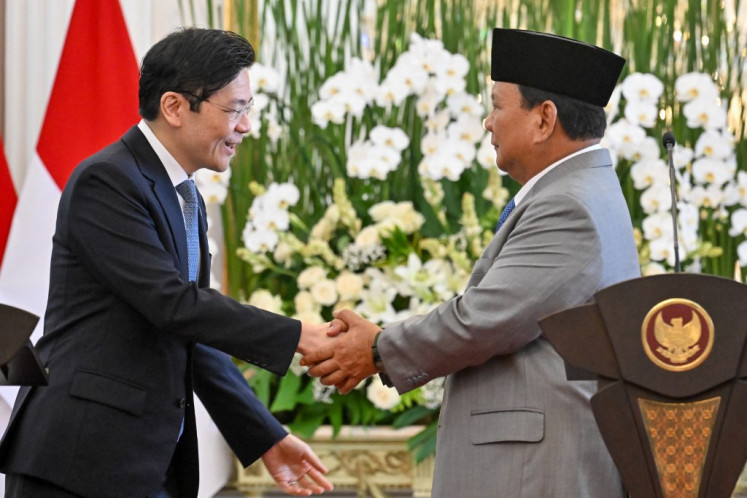Rishi Vidhyadhar: Relax, learn how to breathe
Rishi: (Courtesy of Sonia Lakhiani)As modern material culture floods through Indonesia, it can become more difficult to lead a balanced, mindful life
Change text size
Gift Premium Articles
to Anyone
 Rishi: (Courtesy of Sonia Lakhiani) (Courtesy of Sonia Lakhiani)
Rishi: (Courtesy of Sonia Lakhiani) (Courtesy of Sonia Lakhiani)
Rishi: (Courtesy of Sonia Lakhiani)
As modern material culture floods through Indonesia, it can become more difficult to lead a balanced, mindful life. Life becomes more fast-paced and filled with distractions, and people often seek contentment in buying consumer goods.
Renowned spiritual teacher Rishi Vidhyadhar is in Indonesia to teach people about a different technique, one that he says enables people to lead a 'designer life'.
For the last 15 years, Vidhyadhar has been with the international spiritualist NGO, The Art of Living. He tours different countries teaching people how to achieve fulfilled, balanced and stress-free lives through breathing technique.
The Art of Living is a non-profit organization started by Sri Sri Ravi Shankar in 1981 that now holds courses in 155 countries. It has three main centers in Indonesia ' Jakarta, Medan and Bali.
'The Art of Living is based on a very beautiful secret of life, which teaches us that our mind and breath are connected,' said Vidhyadhar.
'An example would be whenever a person experiences a negative emotion in his mind, you will see his breathing pattern become shallow and fast. If a person is full of love, contentment, happiness, compassion and belongingness, you will notice the person's breath is deep, long and with a beautiful rhythm.'
According to Vidhyadhar, the breath and the mind are connected. He compares a mind to a kite: when the string is short the kite becomes unsteady, but if it is long then the kite will be still. 'If our breath is still and long the mind is steady. If the breath is shallow and fast the mind is unsteady,' he said. 'We need to do something with the breath so that we can do something for the mind.'
The Art of Living also aims to help people let go of the past by stationing the mind in the present moment. Learning how to breathe can help achieve this. The Art of Living offers the Happiness Program, which teaches several different breathing processes.
The training program starts with the basic course, in which beginners are taught to take long, slow breaths by inhaling and exhaling through the nose. At some point in the breathing rhythm, one's negative emotions will be released, usually through crying or laughing.
'If you breathe consciously in certain rhythms, you ventilate all your suppressed stresses and emotions,' said Vidhyadhar. 'Life is like a hand phone, if we don't delete messages, the inbox will be full one day and will not allow new messages. Most people do not know how to delete the old messages from their minds. This is what we do in the Art of Living: We help people delete the old, unwanted messages in their mind. From there, humans experience focus in life, and they are able to move forward to a designer future.'
Vidhyadhar added that learning breathing technique could help people through difficulties and uncertainties in life. The Art of Living has helped disaster victims overcome trauma, for example in Yogyakarta, where the organization worked with earthquake survivors.
Counterintuitively, Vidhyadhar advises not trying to handle the mind with logic, as adding thinking on top of thinking could worsen the problem. He also says people today attempt to quiet their minds by appealing to pleasures, of which he distinguishes five 'sense' pleasures and four 'logical' pleasures.
The sense pleasures are sight, sound, smell, taste and touch, while the logical ones are money, fame, power and progeny. Any human being dependent on these pleasures would become unhappy or lost in complications, Vidhyadhar said.
'Studies have shown that people who cannot handle their minds will resort to illegal drugs, sleeping tablets and, for some, suicidal tendencies.'
Starting from humble beginnings, Vidhyadhar moved his way up to become a well-to-do textile businessman in the city of Surat, Gujarat, India. Though he was accomplished and successful, he felt that something was missing.
'I could change my car, offices or houses anytime I wanted to,' he said. 'When I made my first 100,000, I would target 200,000. I was also searching for contentment through studies, friendship, business and marriage, but it just gave me glimpses, not the sight of what I was seeking.'
In 1991, he took The Art of Living's basic course, now called the Happiness Program. But it was only in 1998 when he learned the Sudarshan Kriya ' a technique that uses natural breathing patterns to put the mind, body and emotions in harmony ' that he alighted on a profound meaning to life.
'I cried tears of joy because I finally found the fulfillment which I had been looking for over the last 36 years of my life,' Vidhyadhar said. 'I was free of negative emotions and thoughts. It is not what you have [money] but how long you can keep your mind still. When the mind is in a state of equilibrium, then one becomes more creative and the capacity to work increases.'
In this clear state of mind, Vidhyadhar could have increased his earnings. He opted instead to leave the material world behind and become a teacher at The Art of Living. 'People are longing for contentment,' he said.
'I told myself, why don't I become a teacher for this faculty of knowledge and travel all over the world to teach what I learned?'
Vidhyadhar is confident that in the future a lot of people will practice the breathing exercises. That the practice is not connected to any religion, country, or race makes it even more appealing. The Art of Living is more like a science of the mind and breath than anything else.
'There are three types of situation in life,' Vidhyadhar said. 'The first is, 'I have enough, and I don't want more.' The second, 'I want more'. The third, 'I want nothing.' When you can say the last sentence at one point of your life, then you are a full-fledged fulfilled person.'









